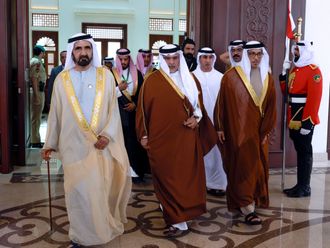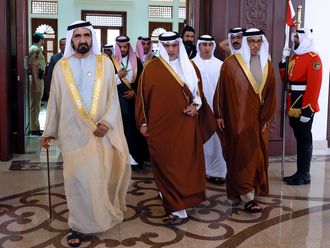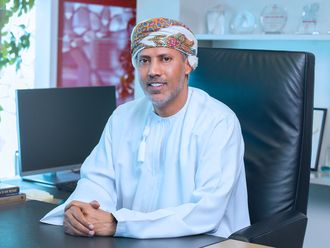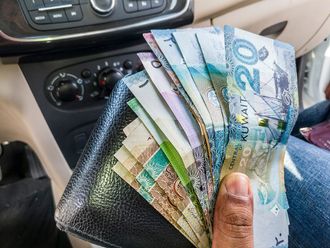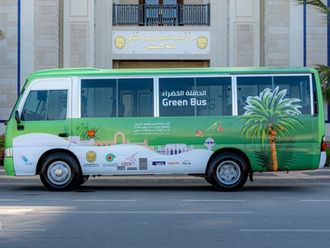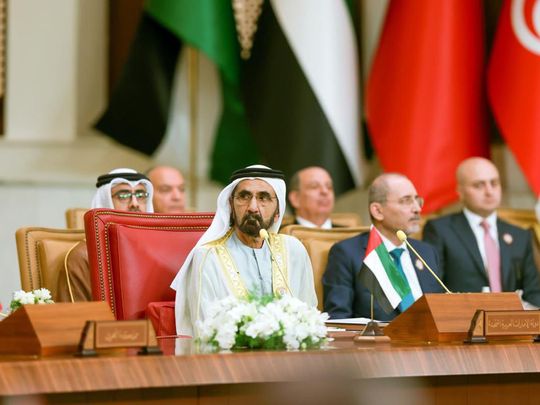
Dubai: The 22-member Arab League on Thursday called for a complete Israeli pullout from Gaza and lifting of its blockade on the now ravaged territory.
The members of the League who met in Manama also called for the deployment of international peacekeeping forces in the Palestinian Territories until the implementation of the two-state solution.
Their announcement was part of the Bahrain Declaration issued after the conclusion of the Arab League Summit in Manama. The declaration affirmed the UN Security Council’s responsibility to take measures needed for implementing the two-state solution and ending the Palestinian-Israeli conflict.
The leaders emphasised the need for Israel to halt its aggression, withdraw its troops from Gaza and lift the blockade. They also condemned the Israeli forces’ takeover the Rafah crossing.
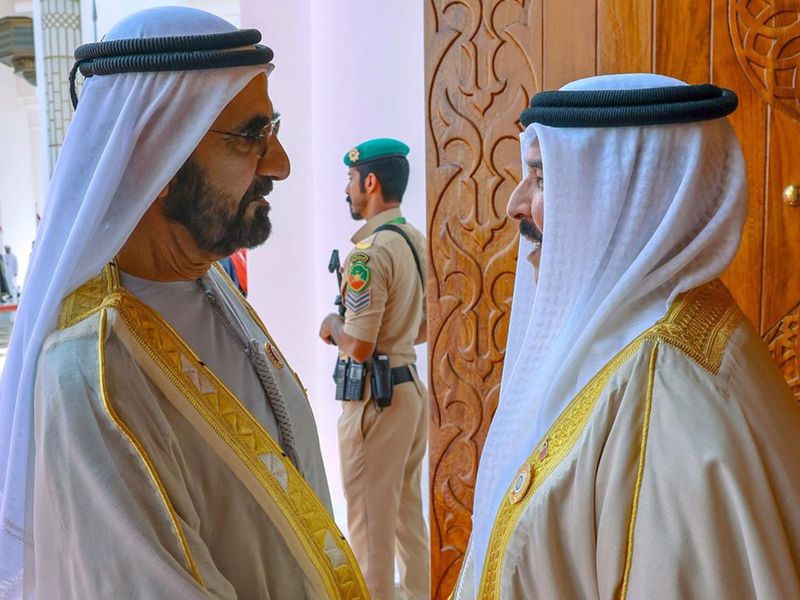
“Today, I led the UAE delegation to the Arab League Summit in Bahrain. The main theme of the summit was the Palestinian cause, the ongoing aggression on the Gaza Strip for seven months and the enduring humanitarian crisis there,” the Vice-President said in a post shared on his official X account.
“The UAE’s position is firm and continues to support the rights of the Palestinian people. Through our humanitarian and relief efforts in the Gaza Strip, the UAE leads all countries in providing relief aid on the ground. Our political efforts, which recently culminated in the United Nations voting for full membership of the State of Palestine, reflect our commitment. Today, we also support all the summit’s resolutions to uphold the rights of the Palestinian people and to stop the ongoing aggression against our people in the Gaza Strip,” he said.
Sheikh Mohammed pointed out that the summit discussed a host of topics related to solidify Arab cooperation in economic, political and social domains. “We also discussed a range of topics to consolidate Arab cooperation in the economic, political, and social spheres. Promoting joint Arab action is a political, economic and security priority for the UAE. We will continue to build bridges of cooperation with everyone,” Sheikh Mohammed added.
Sheikh Mohammed was accompanied by Sheikh Mansour bin Zayed Al Nahyan, Vice- President, Deputy Prime Minister and Chairman of the Presidential Court, other sheikhs and senior officials. -- Khitam Al Amir, Chief News Editor
The Bahrain summit announced its rejection of all attempts to drive the Palestinians from their homes, reiterating that such attempts will be confronted.
The summit also called on all Palestinian factions and parties to unite under the umbrella of the Palestinian Liberation Organisation.
Host Bahrain earlier called for a Middle East peace conference on Thursday at the start of an Arab League summit dominated by the Israel-Hamas war, which has been raging in the Gaza Strip without a ceasefire in sight.
King Hamad bin Eisa Al Khalifa was addressing fellow heads of state and government at the 22-strong grouping in the capital Manama, more than seven months into a conflict that has convulsed the region.
“(We) call for an international conference for peace in the Middle East, in addition to supporting full recognition of the State of Palestine and accepting its membership in the United Nations,” said the king.
President Mahmoud Abbas said the Palestinian government has not received the financial support it had expected from international and regional partners.
Also read
“It has now become critical to activate the Arab safety net, to boost the resilience of our people and to enable the government to carry out its duties,” Abbas said.
Funding of the Palestinian Authority, the body which exercises limited governance of the occupied West Bank, has been severely restricted by a dispute over transferring tax revenue Israel collects on behalf of the Palestinians.
Funding from international donors has also been squeezed, falling from 30% of the $6 billion annual budget to around 1%, Palestinian Prime Minister Mohammad Shtayyeh has said.
Israel evades Gaza ceasefire efforts
Egyptian President Abdul Fattah Al Sissi said Israel continues to evade efforts to reach a ceasefire in its war with Hamas in Gaza.
Al Sissi added that Israel is pursuing its military operations in Rafah, the southern border city between Egypt and Gaza, and using the city’s border crossing from its Palestinian side “to tighten the siege of the enclave.”
Israel and Egypt have traded blames for the responsibility of the crossing’s closure, which has been a vital route for aid to the coastal territory, where a humanitarian crisis has deepened and some people are at risk of famine.
Israel said on Tuesday that it was up to Egypt to reopen the Rafah crossing and allow humanitarian relief into the Gaza Strip, prompting Cairo to denounce what it described as “desperate attempts” to shift blame for the blockage of aid.
“We found Israel continuing to escape its responsibilities and evade efforts exerted to reach a ceasefire,” Al Sissi said.
“Those who think that security and military solutions are able to secure interests or achieve security (are) delusional,” Al Sissi added.
Red Sea attacks condemned
The summit also condemned attacks on ships in the Red Sea and the endangerment of freedom of navigation.
It reaffirmed its unwavering support for the Presidential Leadership Council in Yemen and emphasised the need to resolve the Syrian crisis in a manner that preserves its sovereignty and territorial integrity.
The declaration urged the Sudanese Army and the Rapid Support Forces to settle the crisis and adhere to the Jeddah platform.
The Bahrain declaration also reiterated support for the Hashemite Custodianship of Islamic and Christian holy sites in Jerusalem.
It is the first time the bloc has come together since an extraordinary summit in Riyadh, capital of neighbouring Saudi Arabia, in November that also involved leaders from the 57-member Organisation of Islamic Cooperation, based in the Saudi city of Jeddah.
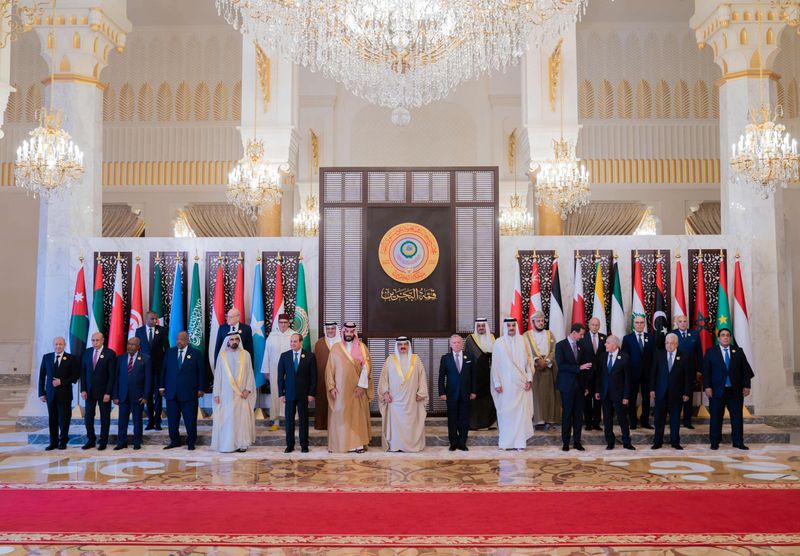
Two-state solution
At that meeting, leaders condemned Israeli forces’ “barbaric” actions in Gaza but declined to approve punitive economic and political steps against the country, despite growing anger in the region and widespread support for the Palestinian cause.
That could change this time around as backing builds globally for a two-state solution long advocated by Arab countries, said Kuwaiti analyst Zafer Al Ajmi.
Western public opinion has become “more inclined to support the Palestinians and lift the injustice inflicted on them” since Israel’s creation more than 70 years ago, Al Ajmi said.
Meanwhile, Israel has failed to achieve its war objectives including destroying Hamas and is now mired in fighting, he said.
The war broke out after Hamas’s October 7 attack on southern Israel which resulted in the deaths of more than 1,170 people, mostly civilians, according to an AFP tally of Israeli official figures.
The militants also seized about 250 hostages, 128 of whom Israel estimates remain in Gaza, including 36 the military says are dead.
Israel’s military retaliation has killed at least 35,272 people, mostly civilians, according to the Hamas-run Gaza’s health ministry, and an Israeli siege has brought dire food shortages and the threat of famine.
Change of ‘tone’
Israeli Prime Minister Benjamin Netanyahu on Wednesday said nearly 500,000 people had been evacuated from the southern Gaza city of Rafah, where he is insisting on going after remaining Hamas battalions despite objections from US President Joe Biden.
He also disputed claims that Israeli operations there would trigger a “humanitarian catastrophe”, though much of the international community remains squarely opposed to a Rafah invasion.
Against that backdrop, and with mediator Qatar describing talks on a truce and hostage release deal as close to a stalemate, “the tone of Arab countries has changed”, Al Ajmi said, raising the possibility that the final declaration out of Thursday’s summit could include “binding” measures.
The message would be especially strong coming from a summit held in Bahrain, one of two Gulf countries to normalise ties with Israel in 2020 under the US-brokered Abraham Accords.
Beyond the Israel-Hamas war, Arab leaders are also expected to discuss conflicts in Sudan, Libya, Yemen and Syria, whose President Bashar Al Assad is present after returning to the Arab fold last year.
Attacks by Yemen’s Al Houthi militants on Red Sea shipping, which the rebels say are intended as a show of solidarity with Palestinians, could also be on the agenda, said Bahraini analyst and journalist Mahmeed Al Mahmeed.
Bahrain joined a maritime coalition organised by Washington to counter those attacks.
“These vital sea lanes are not only important for countries in the region, but also for the global economy,” Mahmeed said.



